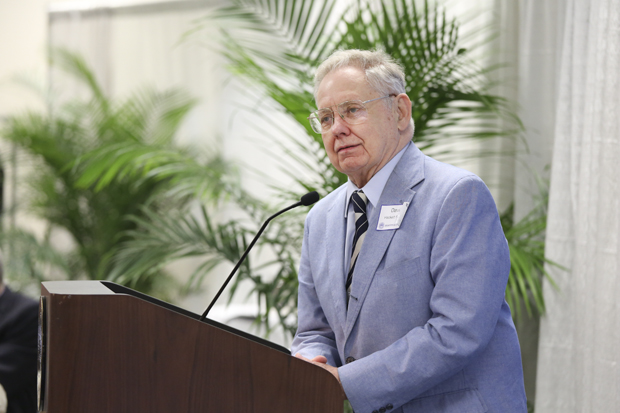Retiring historian David Hackett Fischer takes the long view
Fischer’s retirement marks the end of a career as one of Brandeis’ most beloved professors, renowned for his commitment to both his students and his scholarship

An hour ahead of his service leading the processional as grand marshal for the university’s 66th Commencement on Sunday, the retiring University Professor and Earl Warren Professor of History shared some insights about the “Brandeis Idea” during a short address at the Fellows and Trustees Breakfast.
He told the more than 100 attendees at the annual pre-Commencement gathering that some of Brandeis’ founders envisioned the university becoming an institution of higher education similar to small colleges like Amherst and Wellesley, while others imagined a center of higher learning in the European tradition — without “football and fraternities.”
Founding president Abram Sachar, who had experience with both the American and European models, sought to merge higher education and higher learning at Brandeis, according to Fischer.
“He wanted to promote higher learning in the teaching of undergraduates and also make Brandeis useful to the wider world outside campus,” Fischer said.
Fischer said famed American composer Leonard Bernstein, a member of the Brandeis faculty in the 1950s and later a fellow and trustee, personified this higher education/higher learning hybrid as he created new ways of thinking about and presenting music.
He pointed to Bernstein’s efforts to fuse classical music with the American tradition at Brandeis in “Trouble in Tahiti,” his opera that had its premiere at the university’s inaugural Festival of the Creative Arts in 1952. Although panned by critics, the work established a foundation for Bernstein musicals to follow, including the classic “West Side Story” in 1957.
Fischer said that Bernstein stayed connected with Brandeis until his death in 1990, serving as a trustee emeritus following his tenure on the Board of Trustees. “I think he did so because he believed in the combination of higher education and higher learning in service of a larger purpose,” Fischer said.
Fischer’s retirement marks the end of a career as one of Brandeis’ most beloved professors, renowned for his commitment to both his students and his scholarship. He joined the Brandeis faculty in 1962 and taught more than 110 semesters at the school. Universally regarded as one of the world’s leading historians, Fischer’s books include “Washington’s Crossing,” which earned him the Pulitzer Prize; “Champlain’s Dream”; “Albion’s Seed”; and “Fairness and Freedom.”
Before Fischer’s address on Sunday, Fellows Carol Bernstein Finn and Elaine Reuben ’63 received their ceremonial hoods from President Ron Liebowitz and Nancy Winship, P’10, P’13, senior vice president of institutional advancement, during a brief ceremony.
Categories: Humanities and Social Sciences





